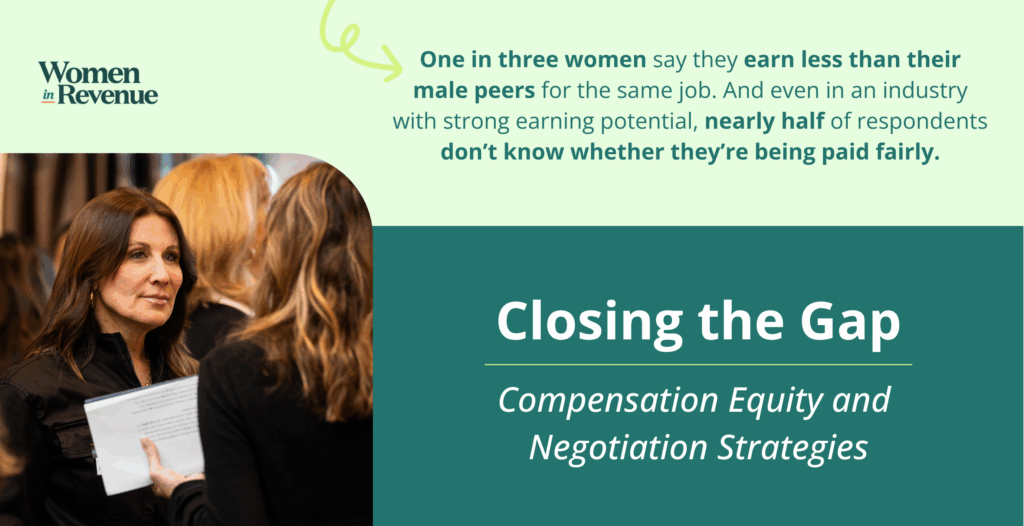There’s never been a better time to talk about money.
Women are performing at the highest levels, but too many still aren’t earning what they deserve.
According to the Women in Revenue 2025 Annual Report, one in three women say they earn less than their male peers for the same job. And even in an industry with strong earning potential, nearly half of respondents don’t know whether they’re being paid fairly.
So how do we close the gap?
Women in Revenue teamed up with Betts Recruiting to answer that question head-on.
Recruiters hear it all when it comes to compensation and career moves, and they’ve seen the patterns play out again and again. Combine that frontline experience with the data from our annual report, and four key strategies emerge.
These are the four moves you can make right now to better advocate for your value and close persistent pay gaps.
#1 Transparency Isn’t a Perk. It’s a Prerequisite.
Let’s start with the most basic problem.
Many women can’t fight for equal pay because they have no idea what others in similar roles are earning. In the WIR annual report, 49 percent of respondents said they simply didn’t know how their compensation compared to that of their male peers.
That uncertainty creates a power imbalance during salary discussions. It also delays progress toward pay equity. In fact, transparent compensation ranked as one of the top five most important benefits for women in revenue this year, even ahead of performance-based incentives and equity.
Companies are slowly responding. States like California, New York, and Colorado now require salary ranges to be listed for open roles. And platforms like Salary.com and Glassdoor provide useful benchmarking data.
But the fastest way to change the culture is to normalize salary conversations within our networks.
“In many cases, women candidates are offered more, not less, because companies are under pressure to build diverse teams,” says Frances Keeler, Recruiting Director at Betts. “But women often don’t ask for more unless they have a reason.”
Try This Before You Negotiate
Ask your trusted network what they’re seeing. Get two to three data points for base pay, bonus structure, and equity ranges. If you’re not sure how to start that conversation, ask someone for general guidance first. You don’t need exact numbers to uncover useful trends.
#2 Negotiating Isn’t Optional. It’s Strategic.
Most women know they should negotiate. But the confidence gap still looms large.
In the WIR Annual Report, women rated their confidence in negotiating non-salary compensation like bonuses, commissions, and equity at just 5.4 out of 10. That’s up slightly from last year, but still far too low.
While progress is happening, too many women are leaving money on the table simply because they’re not sure how or when to push back.
This is where preparation becomes your best asset.
“Compensation isn’t just about what you want,” says Lamar Nava, Betts’ Director of Customer Success. “It’s about what the company can afford, what the role is budgeted for, and what the market rate says. That’s why we coach candidates to understand their value, ask informed questions, and know their options beyond just base salary. Sometimes, everyone on the team is making the same, so negotiating means getting creative with total comp.”
“It’s not just about asking for more, it’s about knowing what ‘more’ should be,” adds Juliet Goswell, Recruiting Manager at Betts. “We help candidates understand market value so they don’t leave money on the table just to avoid an uncomfortable conversation.”
Try This Before Starting Any Comp Conversation
Quantify your achievements. Instead of saying “I helped grow revenue,” say “I drove a 30 percent increase in Q4 pipeline and influenced two of the year’s top deals.” Bring those numbers into your negotiation with the same clarity you’d use to pitch a deal.
#3 Mentorship Is the Missing Link
Negotiating in a vacuum is hard. That’s why women with mentors are often better equipped to advocate for themselves.
The WIR report found that mentorship is now the top workplace challenge for women in revenue, with 44 percent citing it as a critical gap. And among those who do have mentors:
- More than half say they’ve received guidance on navigating a professional challenge like asking for a raise
- Mentors are especially helpful when it comes to navigating the gray areas of compensation
A trusted advisor can offer both strategy and support from figuring out when to bring up salary to knowing how to structure your ask.
Try These Mentorship Tips:
- Join a mentorship program like the one offered by Women in Revenue
- Ask someone you admire if they’d be willing to offer advice
- You don’t need a formal arrangement. Sometimes just a 30-minute call can unlock clarity and confidence.
#4 Don’t Just Land a Job. Choose a Culture.
It’s easy to focus on compensation during a job search and forget to evaluate the broader culture that shapes it.
But the WIR annual report shows that systemic inequities are still present, even in high-paying roles. Forty-three percent of respondents considered quitting in the past year, and many cited pay disparities and lack of advancement as contributing factors.
The truth is, pay gaps don’t always result from a single bad offer.
“We don’t typically see inequity in the offers we present, but that doesn’t mean it’s not there,” says Lauren Stempel, VP of Global Recruiting at Betts. “The gap often starts earlier, with someone being underpaid in a previous role, then accepting a 10% bump that’s still below market.”
That’s why company culture matters. Organizations with a strong commitment to equity don’t just check a box during the offer stage.
Instead, they ask harder questions about pay history, reassess incoming offers against market benchmarks, and look for patterns that might perpetuate unfair compensation. If a company doesn’t examine these issues, or worse, avoids them, that’s a red flag.
A culture that embraces transparency, equity, and fairness is more likely to close pay gaps over time. One that avoids those conversations may quietly reinforce them.
Try This When Interviewing
Ask to speak with someone in a peer-level role. Ask what career progression looks like at the company and whether salary ranges are visible internally. If the answers are vague, that’s a signal to dig deeper before accepting an offer.
Your Paycheck Shapes More Than Your Lifestyle
Your compensation is your role, but more importantly, it’s your voice, your value, and your ability to build long-term security for yourself and your family.
According to the WIR Annual Report, 35 percent of women reported receiving a salary increase last year. That’s progress, but it’s not equity, and it’s certainly not enough.
That’s why we need to keep sharing stories, comparing notes, and advocating for one another. Your negotiation is personal, but you’re not alone in it.
Whether you’re getting ready to switch jobs or simply want to renegotiate your current role, now is the time to ask for more. Not only because you need it, but because you’ve earned it.
Want to join the conversation?
Connect with other women navigating the same challenges in the Women in Revenue Slack community. Or check out our upcoming events for more opportunities to learn, grow, and lead.




